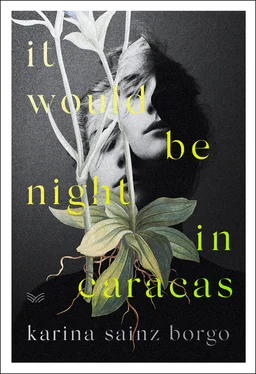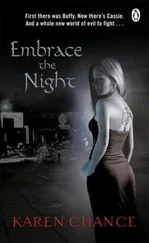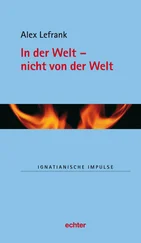IT WOULD BE NIGHT IN CARACAS
Karina Sainz Borgo
Translated from the Spanish by Elizabeth Bryer

HarperVia
An imprint of HarperCollins Publishers
1 London Bridge Street
London SE1 9GF
This eBook first published in Great Britain by HarperVia in 2019
Copyright © Karina Sainz Borgo 2019
English translation copyright © Elizabeth Bryer 2019
Cover design by Stephen Brayda
Cover images © Carnation and Gentian Ehret, Georg Dionysius [1710-70], Victoria & Albert Museum /Bridgman Images/Meredith Adelaide/Stocksy Unites
Karina Sainz Borgo asserts the moral right to be identified as the author of this work
A catalogue record for this book is available from the British Library
All rights reserved under International and Pan-American Copyright Conventions. By payment of the required fees, you have been granted the non-exclusive, non-transferable right to access and read the text of this e-book on-screen. No part of this text may be reproduced, transmitted, down-loaded, decompiled, reverse engineered, or stored in or introduced into any information storage and retrieval system, in any form or by any means, whether electronic or mechanical, now known or hereinafter invented, without the express written permission of HarperCollins
Source ISBN: 9780008359911
Ebook Edition © October 2019 ISBN: 9780008359935
Version: 2019-09-26
To the women and men who came before me.
And to those who will come after.
Because all stories about the ocean are
political, and each of us
is searching for a land to call home.
Ay, nothing can intimidate you, poet,
Not even the wind in the wires …
Lift your head
But may the words you write
Make sense.
—YOLANDA PANTIN,
“The Pelvic Bone”
They willed me bravery. I wasn’t brave.
—JORGE LUIS BORGES,
“Remorse”
translated by Willis Barnstone
I too was reared, like thee, in exile.
—SOPHOCLES
translated by F. Storr
Contents
Cover
Title Page
Copyright
Dedication
Epigraph
We Buried My Mother …
Utter Destruction …
When we Arrived …
I Thought Three Boxes …
I Heard Gunshots …
I Took Stock …
I Went Out …
In The Midst …
My Mother’s Belongings …
The Last Box …
A Man With Gunshot …
It Was My Fifth Visit …
What did You do Today …
I Woke Outside …
We Were Eating …
Stitch You Alive …
I’d Never Witnessed a Birth …
I Studied the Exits …
I Had no Idea …
I Looked at the Ceiling …
Aurora Peralta Teijeiro …
Also in the Red Binder …
In La Encrucijada …
Do You Mistrust Me …
I Woke to Gunfire …
I Sat on the Floor …
The Agent …
The Process …
After Santiago Left …
They’d Stolen the Vase …
Calling Passenger …
I Went to the River …
A Family was Waiting …
A Note From the Translator
Acknowledgments
About the Author
About the Publisher
WE BURIED MY MOTHER with her things: her blue dress, her black flats, and her multifocals. We couldn’t say good-bye in any other way, couldn’t take those things from her. It would have been like returning her to the earth incomplete. We buried it all, because after her death we were left with nothing. Not even each other. That day we were struck down with exhaustion. She in her wooden box; I on a chair in the dilapidated chapel, the only one available of the five or six I tried for the wake. I could hire it for only three hours. Instead of funeral parlors, the city now had furnaces. People went in and out like loaves of bread, which were in short supply on the shelves but rained down in our memory whenever hunger overcame us.
If I still say “we” when I talk about that day it’s out of habit, for the years welded us together like two parts of a sword we could use to defend each other. Writing out the inscription for her headstone, I understood that death takes place in language first, in that act of wrenching subjects from the present and planting them in the past. Completed actions. Things that had a beginning and an end, in a time that’s gone forever. What was but would never be again. That was the way things were now: from then on, my mother would exist only if worded differently. Burying her meant my life as a childless daughter came to an end. In a city in its death throes, we had lost everything, even words conjugated in the present.
Six people attended my mother’s wake. Ana was the first. She arrived dragging her feet. Julio, her husband, was supporting her by the arm. Ana seemed to be moving through a dark tunnel that disgorged her into the world where the rest of us lived. For months, she had been undergoing treatment with benzodiazepine. Its effects were starting to evaporate. Barely enough pills were left to complete her daily dose. As had happened with the bread, there were Alprazolam shortages, which meant despair prevailed, as potent as our desperation. We could only watch as everything we needed vanished: people, places, friends, recollections, food, serenity, peace, sanity. “Lose” became a leveling verb, and the Sons of the Revolution wielded it against us.
Ana and I met in the Department of Humanities. Since then, Ana’s life and my own were in sync when it came to going through private hells. This time was no exception. When my mother went into the palliative care facility, the Sons of the Revolution arrested Santiago, Ana’s brother. Dozens of students were apprehended that day. They ended up with their backs red raw from the pellets, bludgeoned in a corner, or raped with the barrel of a gun. Santiago got the La Tumba treatment—a combination of all three.
He spent more than a month inside the prison, which extended five floors belowground. Sounds were muffled and there were no windows, no natural light, and no ventilation. The only noises were the screech and clatter of the metro rails above. Santiago was locked inside one of the seven cells. They were aligned one behind the other, so he couldn’t see who else was detained. Each cell measured two by three meters. The floor and walls were white. So were the beds and the bars through which his jailers pushed trays of food. It never came with cutlery; if he wanted to eat, he had to do so with his hands.
For several weeks there had been no word from him. Ana wasn’t even getting the calls she paid periodic sums of money for any longer, or the faulty proof of life she received previously in the form of photos sent from a different phone number each time.
We don’t know if he’s alive or dead. “We’ve had no news,” Julio said in a low voice, moving away from the chair where Ana spent thirty minutes staring at her feet. The whole time, she only raised her head to ask three questions.
“What time will Adelaida be buried?”
“At two thirty.”
“Okay,” she murmured. “Where?”
“In La Guarita cemetery, the old part. My mother bought a plot a long time ago. It has a nice view.”
“Okay …” Ana seemed to be making an effort, as if processing my words were a titanic task. “Do you want to stay with us today, until the worst of it is over?”
“I’m leaving for Ocumare early tomorrow to go see my aunts. I’ve got to give them a few things,” I lied. “But thank you. This is a difficult time for you too, I know.”
Читать дальше













